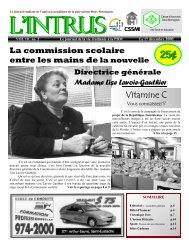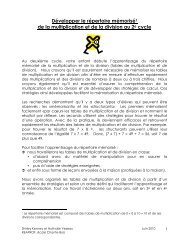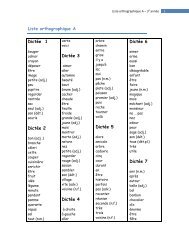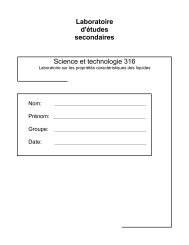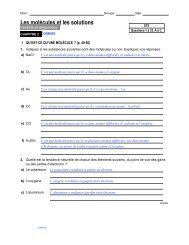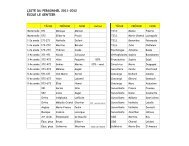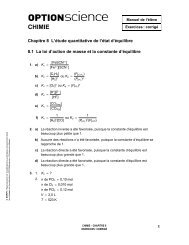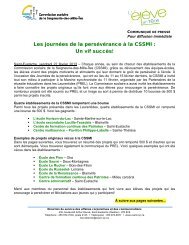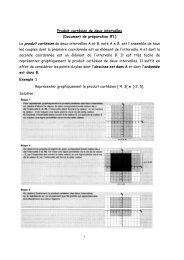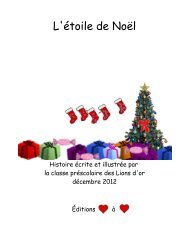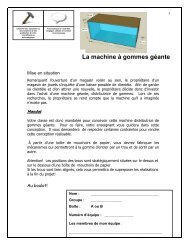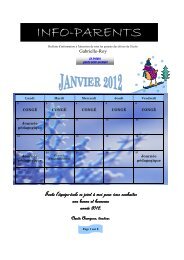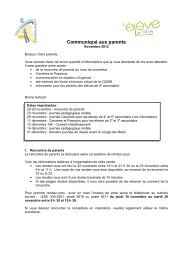Guide du PPCS sur l'enseignement et l'apprentissage ...
Guide du PPCS sur l'enseignement et l'apprentissage ...
Guide du PPCS sur l'enseignement et l'apprentissage ...
Create successful ePaper yourself
Turn your PDF publications into a flip-book with our unique Google optimized e-Paper software.
Annexes – Annexe 2 : Liste de lectures recommandées<br />
Construction d’une base disciplinaire<br />
BOIX MANSILLA, V. 2004. B<strong>et</strong>ween repro<strong>du</strong>cing and organizing the past: High school students’ beliefs about<br />
the standards of acceptability of historical knowledge. International Review of Research History E<strong>du</strong>cation.<br />
P. Lee, ed. Londres, Royaume-Uni : Fran Cass.<br />
CAREY, S. Science e<strong>du</strong>cation as conceptual change. Journal of Applied Developmental Psychology. 2000, 21, 1,<br />
p 13–19.<br />
DONOVAN, S. <strong>et</strong> BRANSFORD, J. 2005. How Students Learn: History, mathematics, and science in the classroom–<br />
Committee on How People Learn, A Targ<strong>et</strong>ed Report for Teachers. Washington (District de Columbia), États-<br />
Unis : National Academies Press.<br />
GARDNER, H. <strong>et</strong> BOIX MANSILLA, V. Teaching for understanding in the disciplines and beyond. Teachers<br />
College Record 96 (2). 1994, p 198–218.<br />
GROTZER, T.A. <strong>et</strong> LINCOLN, R. E<strong>du</strong>cating for ‘intelligent environmental action’ in an age of global warming.<br />
Creating a climate for change: Communicating climate change and facilitating social change. S. Moser &<br />
L. Dilling, eds. 2007, Cambridge, Royaume-Uni : Cambridge University Press.<br />
HOFER, B. <strong>et</strong> PINTRICH, P. The development of epistemological theories: Beliefs about knowledge and<br />
knowing and their relation to learning. Review of E<strong>du</strong>cational Research.1997, 67, p 88–140.<br />
LEE, P. <strong>et</strong> ASHBY, R. Progression in historical understanding. Knowing, Teaching, and Learning History: National<br />
and international perspectives. P. Seixas & S. Wineburg, eds. 2000, New York, États-Unis : NYU Press.<br />
MINSTRELL, J. <strong>et</strong> KRAUS, P. <strong>Guide</strong>d inquiry in the science classroom. How Students Learn: History, Mathematics,<br />
and Science in the Classroom. J. Bransford & S. Donovan, eds. 2005, Washington (District de Columbia), États-<br />
Unis : National Academy Press, p 475–514.<br />
PERKINS, D. 1994. The intelligent eye: Learning to think by looking at art. Santa Monica (Californie), États-Unis :<br />
The G<strong>et</strong>ty Center for E<strong>du</strong>cation in the Arts.<br />
PERKINS, D.N. <strong>et</strong> GROTZER, T.A. Dimensions of causal understanding: The role of complex causal models in<br />
students’ understanding of science. Studies in Science E<strong>du</strong>cation. 2005, 41, p 117–166.<br />
WINEGURG, S. 2000. Historical Thinking and other Unnatural Acts: Charting the future of teaching the past.<br />
Philadelphie (Pennsylvanie), États-Unis : Temple University Press.<br />
WINNER <strong>et</strong> al. Studio Thinking: How visual arts teaching can promote disciplined habits of mind. New<br />
Directions in Aesth<strong>et</strong>ics, Creativity, and the Arts (189–205). P. Locher, C. Martindale, L. Dorfman & D. Leontiev,<br />
eds. 2007, Amityville (New York), États-Unis : Baywood Publishing Company, 2006, p 189–205.<br />
Intégration des perspectives disciplinaires<br />
BROMME, R. Beyond one’s own perspective: The psychology of cognitive interdisciplinarity. Practising<br />
interdisciplinarity. P. Weingart & N. Stehr, eds. 2000. Toronto, Canada : Toronto University Press.<br />
DAWES DURAISINGH, L. <strong>et</strong> BOIX MANSILLA, V. Interdisciplinary forays within the history classroom: How the<br />
visual arts can enhance (or hinder) historical understanding. Teaching History. 2008, décembre 2007.<br />
NIKITINA, S. Three Strategies for Interdisciplinary Teaching: Contextualizing, Conceptualizing, and Problem-<br />
Centering. Journal of Curriculum Studies. 2006, 38, 3, p 251–271.<br />
PERKINS, D., SIMMONS, R. <strong>et</strong> TISHMAN, S. Teaching cognitive and m<strong>et</strong>acognitive strategies. Journal of<br />
Structural Learning. 1990, 10, 4, p 285–303.<br />
<strong>Guide</strong> <strong>du</strong> <strong>PPCS</strong> <strong>sur</strong> l’enseignement <strong>et</strong> l’apprentissage interdisciplinaires 141




